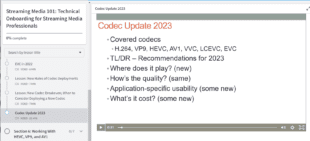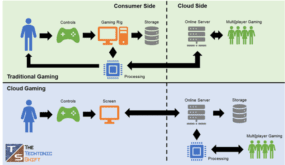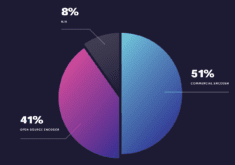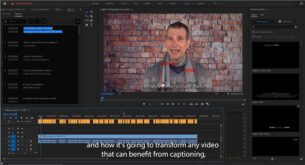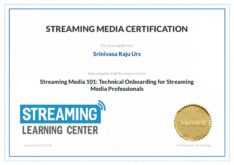HEVC Advance says it hopes to speed the adoption of HEVC decoders among the installed base of computers and devices by making some software downloads royalty free
Seeking to accelerate HEVC deployment to the installed base of computers and mobile devices, HEVC Advance announced this morning that it will seek no royalty on some classes of application software with HEVC encode/decode that are downloaded after the initial purchase. While this exclusion won’t shield software developers from royalty claims by MPEG LA, Technicolor, or any other HEVC IP owners, it’s unquestionably a move in the right direction.
HEVC Advance CEO Peter Moller explained HEVC Advance’s motivation for the move. Tactically, he hopes to start the flow of HEVC decoders among the installed base of computers and devices. Beyond the browsers and players discussed below, Moller explained, “the policy would allow Netflix or Amazon or Hulu or Facebook or CBS etc. to offer apps with HEVC software decode without HEVC Advance getting involved. So their customers could access HEVC video, initially in software only but hopefully this will encourage the OS and browser providers and device manufacturers to enable HEVC in hardware on their devices.”
Strategically, Moller added, “We believe the market needs some leadership and are trying to do our part. Hopefully this will begin a balanced dialogue where we can all work together (including other patent pools and patent owners and key market participants) to solve problems and facilitate adoption. To be clear, our goal is a single reasonable royalty paid at first sale of a device and then everyone and anyone can use that HEVC capability.”
Here’s a description of the new terms.
How it Works
The terms of the exclusion are necessarily complex, and HEVC Advance has posted several documents on its website to assist in interpretation and understanding. Here’s a high-level view.
To qualify for the exclusion, the software must meet three main requirements. First, it must be an application that enables software-only encoding or decoding. If the software uses an existing hardware decoder, of course, there’s no royalty, since a royalty on that hardware should have already been paid. The intent here is to impose a royalty on any software that unlocks HEVC hardware decode previously unavailable on the system for which a royalty would not have been paid.
Second, the software must be downloaded after the initial sale of the product. For example, VLC Player has software HEVC decode. If bundled with a device, the device manufacturer owes a royalty upon the sale of such device. On the other hand, if a computer or mobile device user later downloads VLC after the purchase, there is no royalty.

HEVC Advance won’t seek royalties on software programs like VLC Player downloaded after the initial sale.
Finally, the software must not be specifically excluded. One major exclusion prevents device manufacturers from avoiding the royalty by supplying the software after the purchase, rather than bundled with the purchase. The language also excludes excludes operating systems updates altogether, as well as drivers, libraries, and firmware updates that unlock HEVC decode hardware already on the system. Also excluded are standalone software products “marketed as providing advanced HEVC video functions” that are sold for $45 or more, or on a subscription basis for $3.75/month or more.
Unless bundled with a computer or device, in which case the device manufacturer would owe the royalty, browsers like Firefox and Opera, and applications like VLC Player and HandBrake should be free of any royalty claims from HEVC Advance. On the other hand, if Microsoft Edge and Google Chrome add software-based HEVC decode, and are bundled with Windows or Android systems, the device sellers would owe a royalty. However, versions of the same software downloaded after the sale would be royalty free, so long as it was not provided “with the acknowledgement or cooperation” of the device manufacturer.
Again, it all sounds complex, but the simple goal is to allow owners of devices without HEVC hardware encode/decode to obtain it after purchase without a royalty. Again, check the documentation on the HEVC Advance site for more specifics.
What it Means
Obviously, HEVC Advance is only one of the stakeholders claiming royalties on HEVC. Since the MPEG LA annual cap is $25 million, it’s unlikely that HEVC Advance’s unilateral action would convince companies like Mozilla or Opera to include HEVC decode in their respective browsers. The timing of this article didn’t allow us to check if MPEG LA plans to enact a similar policy, but we will over the next few days and will supplement this article if warranted.
While unquestionably a positive move, the overall impact of HEVC Advance’s move is hard to gauge, and brings to mind the old Chinese proverb, “The best time to plant a tree was 20 years ago. The second best time is now.” Had all HEVC stakeholders implemented this move in 2013, the UHD codec market would undoubtedly be in a different place. Since they didn’t, the Alliance for Open Media happened, with Google, Microsoft, and Mozilla—the three companies that can most quickly make software HEVC decode ubiquitous.
On the other hand, even with the stiff royalties, HEVC hardware adaption is on the rise. For example, mobile phones, tablets, and notebooks benefit the most battery-wise from hardware decode, so that’s becoming an essential feature, while 4K in the living room almost demands HEVC decode for OTT devices, smart TVs and game consoles. So HEVC may soon become ubiquitous among all these devices. At some point, these hardware sales will push Microsoft, Google, and Apple over the multiple HEVC royalty caps, making the inclusion of HEVC software decode in their browsers totally free.
So whether HEVC Advance’s move breaks the logjam remains to be seen. As we said at the top, however, it’s unquestionably a move in the right direction.
 Streaming Learning Center Where Streaming Professionals Learn to Excel
Streaming Learning Center Where Streaming Professionals Learn to Excel

